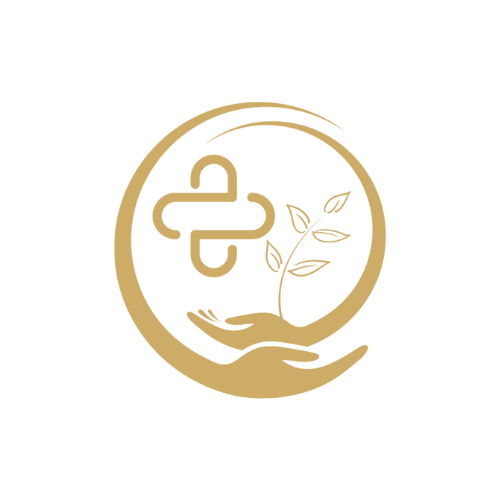SportsPro: Manual Therapists Blend
SportsPro: Manual Therapists Blend
Couldn't load pickup availability
Share
SportsPro Manual Therapists Blend
Unlock the full potential of your treatment with SportsPro Manual Therapists Blend. Tailored for manual therapists like physiotherapists, chiropractors and massage therapists, this powerful formulation combines premium natural ingredients from Australia to provide exceptional pain relief, inflammation reduction, and promotes faster recovery.
Key Ingredients and Benefits:
-
Wintergreen
Wintergreen (Gaultheria procumbens)
Origin: Native to North America.
Traditional Uses:- Used extensively by Native Americans for muscle pain, joint stiffness, and inflammation.
- Steeped into teas for respiratory issues and fever reduction.
- Applied as poultices for sore muscles and wounds.
- Adopted in Western herbal medicine for arthritis and back pain relief.
Effect on the Body: Provides a cooling sensation, improves circulation, and reduces deeper pain.
Precautions: Avoid if allergic to aspirin or salicylates. For external use only. -
Peppermint
Peppermint (Mentha arvensis)
Origin: Native to Europe and the Middle East, now cultivated globally.
Traditional Uses:- Used in Ancient Egypt for soothing pain and aiding digestion.
- Valued by Greeks and Romans for relieving headaches and tension.
- Applied in Chinese and Ayurvedic traditions for cooling the body and reducing muscle pain.
Effect on the Body: Reduces inflammation, relaxes muscles, and provides a refreshing sensation.
Precautions: Can cause mild irritation on sensitive skin; perform a patch test before use. -
Arnica Oil
Arnica Oil (Arnica montana)
Origin: Europe and Siberia.
Traditional Uses:- Used in European folk medicine for bruises, muscle injuries, and sprains.
- Applied as poultices to reduce swelling and inflammation.
- Valued in homeopathy for accelerating recovery after surgery or trauma.
Effect on the Body: Stimulates blood flow, reduces bruising, and alleviates soreness.
Precautions: May cause irritation with excessive use; avoid internal use. -
Hemp Oil
Hemp Oil (Cannabis sativa)
Origin: Central Asia and the Indian subcontinent.
Traditional Uses:- Integral to Ayurvedic medicine for pain relief, wound healing, and relaxation.
- Used in ancient Chinese medicine for easing joint pain and reducing inflammation.
- Regarded as a sacred plant with mood-enhancing effects in many cultures.
Effect on the Body: Relieves chronic pain, eases muscle spasms, and promotes relaxation.
Precautions: Use as directed; avoid ingestion. -
Capsaicin
Capsaicin (Capsicum annum)
Origin: Native to the Americas, especially Central and South America.
Traditional Uses:- Indigenous peoples used chili pepper poultices to relieve muscle pain and arthritis.
- Central American healers applied capsaicin-rich pastes for long-lasting pain relief.
- Recognized in traditional medicine to stimulate circulation and combat cold-related stiffness.
Effect on the Body: Provides sustained pain relief and stimulates circulation.
Precautions: Can cause burning or tingling; avoid contact with eyes and mucous membranes. -
Camphor
Camphor (Cinnamonum camphora)
Origin: Native to East Asia; widely used in Chinese and Ayurvedic medicine.
Traditional Uses:- Treated joint pain, respiratory congestion, and muscle tension in traditional Chinese medicine.
- Used in Ayurveda to balance "Kapha" dosha, stimulate circulation, and alleviate stiffness.
- Applied as a balm for cooling and anti-inflammatory effects.
Effect on the Body: Relieves muscle stiffness and enhances local blood flow.
Precautions: Avoid prolonged use on sensitive skin; not suitable for broken skin. -
Magnesium
Magnesium
Origin: Found naturally in mineral sources and seawater.
Traditional Uses:- Ancient Greeks and Romans used magnesium-rich Epsom salts for muscle relaxation and pain relief.
- European folk medicine valued magnesium for promoting restful sleep and easing nerve tension.
- Applied topically to address cramps and muscle fatigue.
Effect on the Body: Prevents cramps, reduces inflammation, and improves nerve function.
Precautions: For external use only; avoid excessive application. -
Eucalyptus Lemon
Eucalyptus Lemon (Eucalyptus citriodora)
Origin: Native to Australia and Tasmania; used in Aboriginal medicine.
Traditional Uses:- Aboriginal Australians used eucalyptus leaves to heal wounds and reduce fevers.
- Leaves were burned for respiratory relief and steam baths for muscle relaxation.
- Recognized as a powerful anti-inflammatory in traditional remedies.
Effect on the Body: Soothes sore muscles and alleviates joint discomfort.
Precautions: Perform a patch test before use. -
Lavender
Lavender (Lavandula angustifolia)
Origin: Native to the Mediterranean region.
Traditional Uses:- Used in Roman baths for relaxation and muscle recovery.
- Valued in European herbal medicine for soothing burns, cuts, and bruises.
- Widely used in aromatherapy for calming and pain relief.
Effect on the Body: Provides relaxation, pain relief, and improved circulation.
Precautions: Safe for most skin types; dilute if irritation occurs. -
Tarragon
Tarragon (Artemisia dracunculus)
Origin: Native to Siberia and Central Asia.
Traditional Uses:- Used in Asian and European medicine for joint pain and digestive issues.
- Known to reduce inflammation and oxidative stress in folk remedies.
- Regarded as a mild sedative for calming muscle spasms.
Effect on the Body: Alleviates arthritis pain, muscle soreness, and inflammation.
Precautions: Not recommended during pregnancy. -
Ylang Ylang
Ylang Ylang (Cananga odorata)
Origin: Native to Southeast Asia, particularly the Philippines, Indonesia, and Malaysia.
Traditional Uses:- Flowers were used in rituals to relieve stress and promote relaxation.
- Applied in Javanese medicine for lowering blood pressure and improving skin elasticity.
- Incorporated into massage oils for aphrodisiac and tension-relieving effects.
Effect on the Body: Improves overall mood, reduces muscle stiffness, and calms nerves.
Precautions: Use sparingly to avoid overwhelming fragrance effects. -
Tea Tree Oil
Tea Tree Oil (Melaleuca alternifolia)
Origin: Native to Australia.
Traditional Uses:- Crushed leaves were used as antiseptic poultices for skin infections and wounds.
- Added to baths for overall healing and relief of joint pain.
- Valued for its anti-inflammatory and antimicrobial properties in traditional medicine.
Effect on the Body: Soothes irritated skin and reduces swelling.
Precautions: Avoid if allergic to tea tree or similar oils. -
Eucalyptus
Eucalyptus (Eucalyptus globulus)
Origin: Native to Australia; widely used in Aboriginal medicine.
Traditional Uses:- Aboriginal Australians used eucalyptus leaves for treating wounds and infections.
- Leaves were crushed and inhaled to relieve respiratory issues.
- Steam baths with eucalyptus were used to relax muscles and ease joint discomfort.
- Recognised as a powerful anti-inflammatory and pain reliever in traditional remedies.
Effect on the Body: Soothes sore muscles, relieves joint discomfort, and supports respiratory function.
Precautions: Perform a patch test before use. Avoid contact with eyes and broken skin.
Usage Directions:
Application: Apply one pump of SportsPro Manual Therapists Blend to the affected area and massage gently until fully absorbed. Repeat 3-4 times daily or as needed for optimal results.
For External Use Only: Avoid contact with eyes and broken skin. Conduct a patch test for sensitive skin. Discontinue use if irritation occurs.
Storage: Store in a cool, dry place away from direct sunlight to maintain product efficacy.

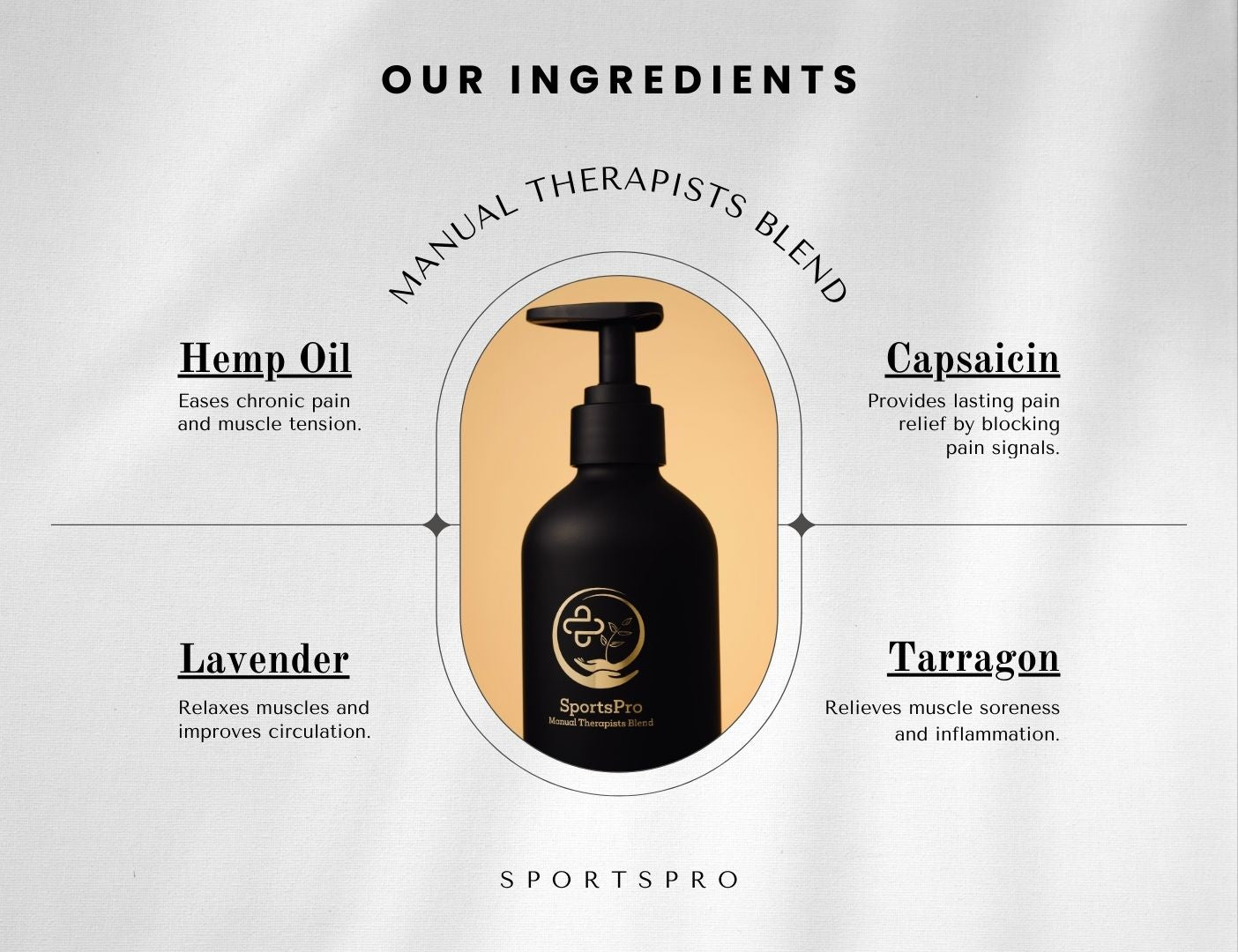
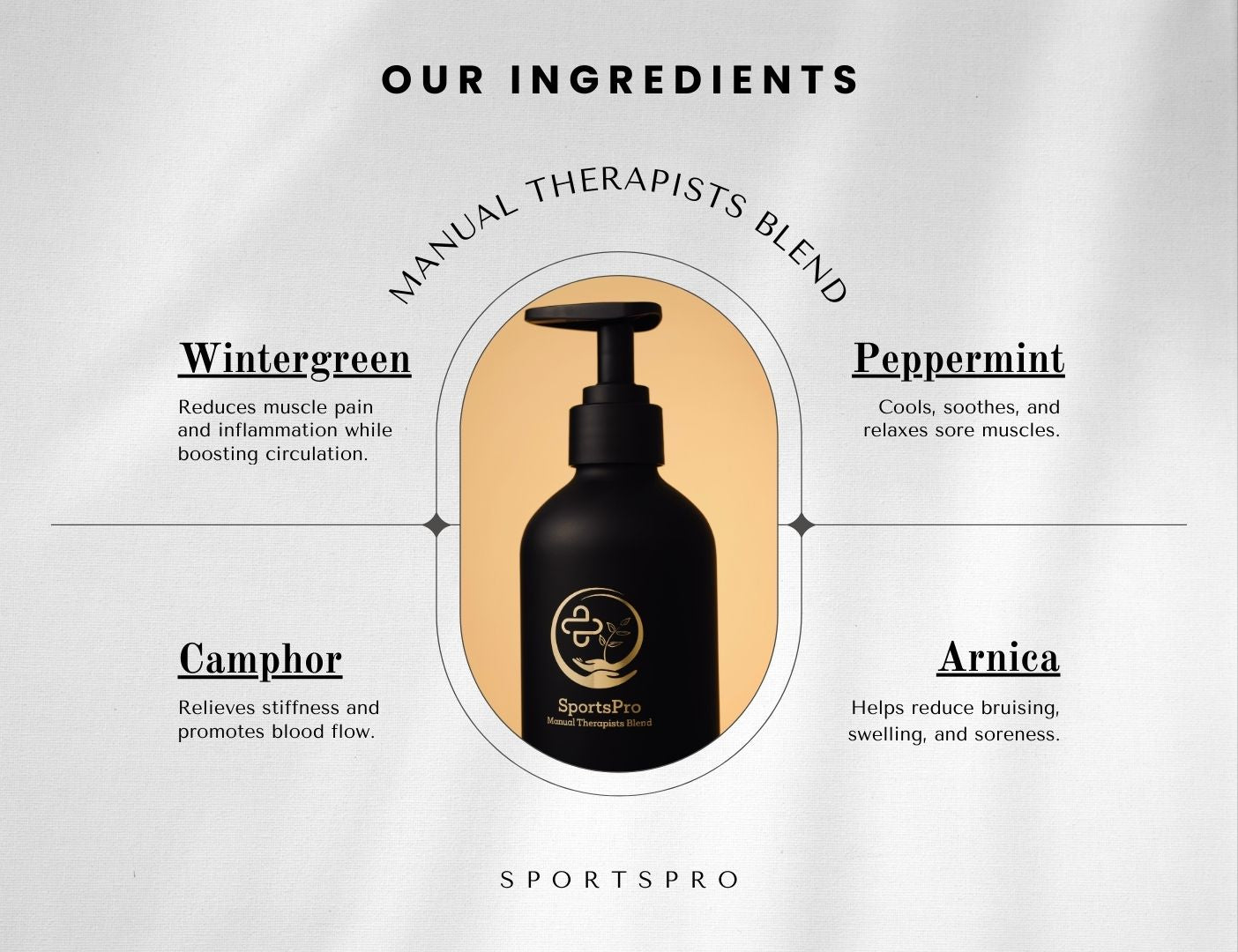
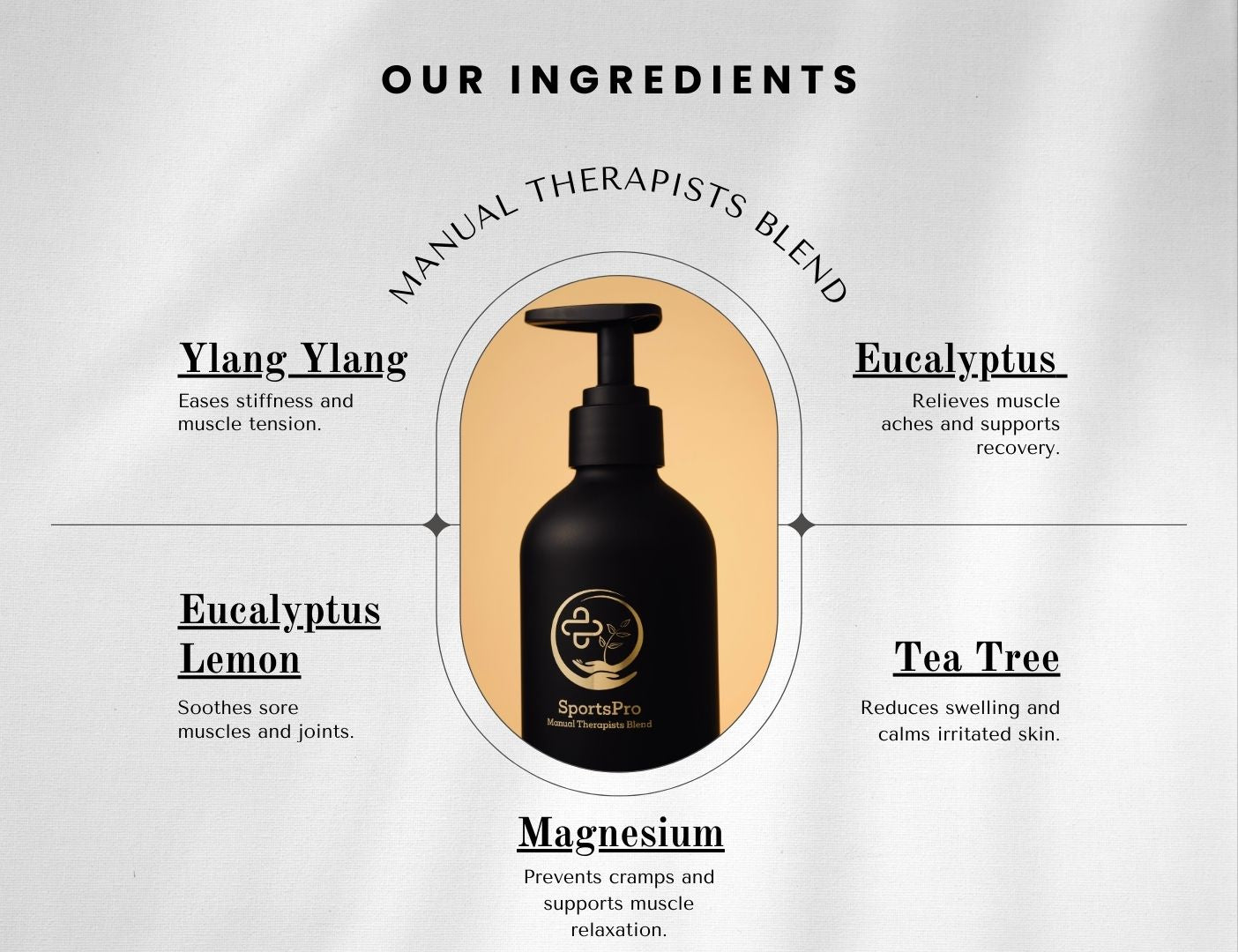
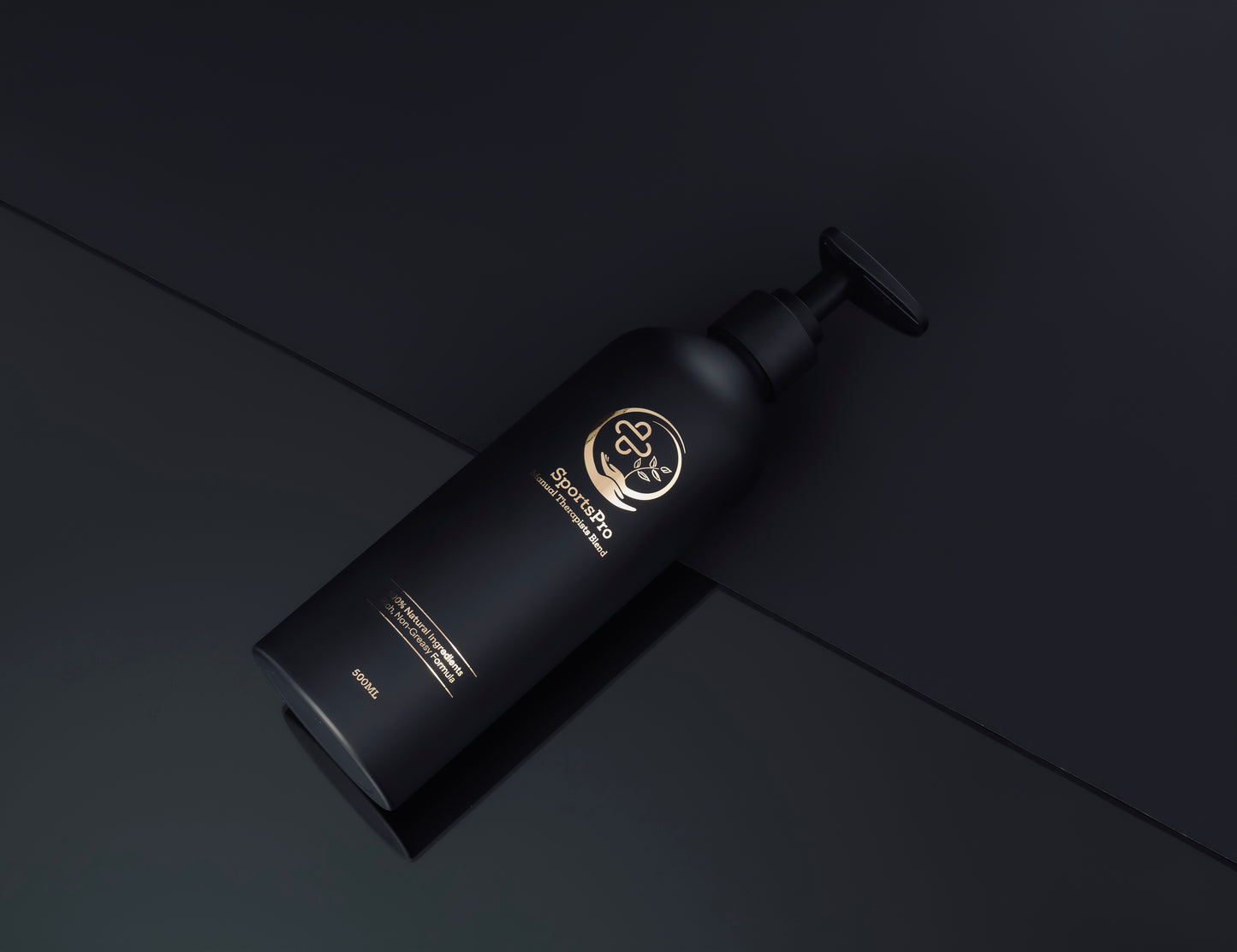

Manual Therapists Blend
Stop Pain in Its Tracks
Whether it’s post-workout soreness, desk-tight shoulders, or stubborn lower back tension, Manual Therapists Blend delivers quick, natural relief that supports effective manual care.
Glide-Optimised
Smooth, controlled manual work with no sticky film
Cooling → Warming
Peppermint and camphor distract pain and unlock tight tissue.
100% Natural
Plant-based actives, no harsh synthetics.
Non-Greasy
Fast-absorbing, clean finish — ideal under tape and supports
The chart shows Manual Therapists Blend delivers therapist-grade glide and natural relief without the greasy feel of typical creams.
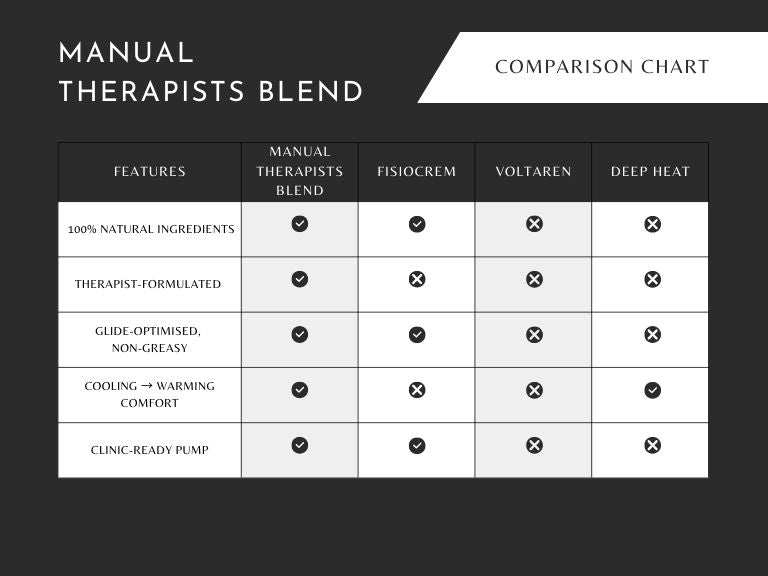
Frequently Asked Questions
Who is it for?
- Manual therapists, physios, chiros, massage therapists
- Athletes and active people
- Anyone wanting natural relief
How do I use it at home?
- Massage a small amount into the target area
- Use 1 FULL pump daily or as directed by your practitioner
- Wash hands after use and avoid the eyes
How fast does it work and how does it feel?
- You’ll feel cooling first, then gentle warmth.
- Most notice relief within minutes.
Can I tape over it?
Yes. It’s non-greasy and tape-friendly. Let it absorb fully, then apply kinesiology or rigid tape for best adhesion.
Can I use it with treatment tools?
- Massage gun/scraping: yes, apply a light layer.
- Cupping: apply after cupping to keep a good seal
- TENS/electrodes: apply after treatment so pads stick well
- Ultrasound: not a coupling gel—use standard ultrasound gel
What areas can I use it on?
Back, neck, shoulders, hips, legs, feet, and arms. Do not use on the face, broken skin, or mucous membranes.
Is it suitable for sensitive skin?
Often well-tolerated, but patch test first. If redness or irritation persists, stop use and seek advice.
Any allergy cautions?
Contains wintergreen (methyl salicylate) and essential oils. If you’re sensitive to salicylates, have fragrance allergies, or use anticoagulants, check with a health professional before use.
Can I use it during pregnancy or while breastfeeding?
Speak with your health professional first. Due to essential oils and salicylates, it’s best to get personalised advice.
Can I combine it with Ultra Concentrate?
Yes. Use Manual Therapists Blend for glide and broad areas. Layer Ultra Concentrate sparingly on stubborn spots for fast, targeted relief.

